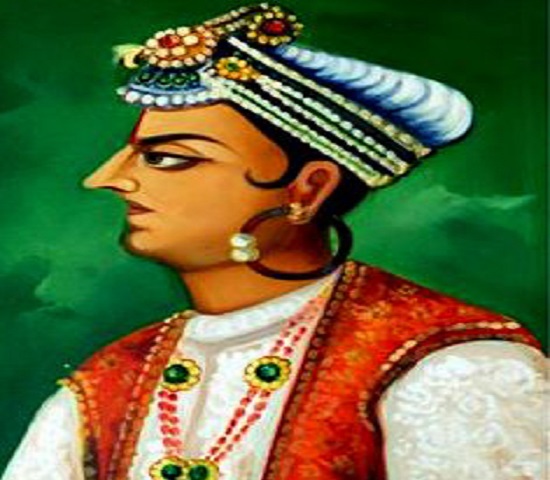Pusapati Ananda Raju II
Pusapati Ananda Raju II (1732-1760) He recaptured visakhapatnam fort from the french and drove them out of the circars with the due support of the British.

Pusapati Ananda Raju II (1732-1760)
Chandrayyamma, wife of Pedda Vizayaramaraju, adopted Venkatapathi Raju, a scion of the family and named him after her departed husband. Hence, he was popularly know as Chinna (Younger) Vizayaramaraju (1748-1794). The policy of duplicity of the English East India Company became evident during his time. The company was convinced that the continuance of the predominant position of Vizianagaram would be detrimental to its larger interests and deicide to degrade it to an inferior status. To their designs, the mechanisationn of Dewan Sitaramaraju, step-brother of Chinna Vizayaramarju, to whose care the just and pious ruler committed the affairs of his principality, came handy. Sitaramaraju was a man of high ambitions and abilities and soon assumed the position of a deficit ruler. No doubt, he greatly added to the power and extent of Vizianagaram but in so doing overrode the sentiments to the people and the interests of the neighbouring Zamindars and lost their good-will. Chinna and the interests of the neighbouring Zamindars and lost their good-will. Chinna Vizayaramaruju though realised the harmful results that would follow the highlander policies of the elder brother and Dewan, could not get rid of him as the latter was constantly backed by the corrupt officials of the Madras Presidency. The vindictive policy of the Madras Presidency did not go unnoticed. The Court of Directors took strong exception to its actions and in their letter dt. 10th January 1781 wrote to the Presidency, “Our surprise and concern were great on observing the very injurious treatment”, which the ancient Raja of Vizianagaram received at the hands of the Presidency, “Our surprise and concern were great on observing the very injurious treatment”, which the ancient Raja of Vizianagaram received at the hands of the Presidency. Inspite of his representations and entreaties, you in the most arbitrary and unwarranted manner appointed his ambitious and intriguing brother Sitaramaraju as Diwan. For however necessary it might be to adopt measures for payment of Company’s tribute no avowd resistance to the Company’s authority could warrant such a treatment of the Raja”. Governor Ramboldt was recalled. Even the House of Commons in their resolution dt. 25th April 1782 censured the policy of the Madras Presidency. “That the Governor and the majority of the council of fort. St. George did by menace and harsh treatment compel Vizayaramaraju to empaley Sitaramarju as Diwan and the gross ill-treatment, which he received at the hands of the Presidency were humiliating and unjust and cruel in themselves and highly derogatory to the interests of the East India Company and the honour of the British nation”.
Inspite of such sharp criticism the Madras Presidency continued to favour Sitaramaraju and it was only in August 1793 that he was finally pensioned off to Madras, Sequestration of the Vizianagaram fort was effected by Col. Pendergast as the Company alleged arrears of tribute to the tune of eight and half lakhs of rupees. Vizayaramaraju was in no position to pay and being already greatly irritated by the policy of the Company was also in no mood to comply with their ever increasing demands. Finding the presence of Vizayaramarju at Vizianagaram ia hinderance to their interests, the Company compelled him to leave his ancestral fort and to retire to Machilipatnam as its pensioner. Vizayaramaraju who placed honour in one eye and death in the other and looked on both indifferently was goaded to defy and retaliate. His martial spirit predominated over prudential considerations. Filled with utmost embittersent he was driven to a position of desperation. On his way to Machilipatnam, he abruptly stopped at Padmanabham and raised the banner of revolt against the company. He preferrred sacrificing his life to living witha tarnished image. He embraced heroic death along with his faithful followers that formed a rampart around his corpse thus making the battle of Padmanabham (10-7-1794) long remembered as the “Flodden field of the Rajuputs of Vizianagarma”. Thus, Pasupathi Chinna Vizayaramaraju is cheershed as the earliest of the freedom fighters who rebelled against the foreign yoke. It was for that reason that the war memorial at Padmanabham is protected by the Department of Archaeology and Museams of the Government of Andhra Pradesh. Chatrati Lakshminarasa Kavi’s. Vizayarama Yasobhushanam’ coming as it does under the category of historical literature had the battle of Padmanabham as its central theme. Besides Adidas Sura Kavi, poets like Challa Subbaraya Sastry, Pujari Tammanna and Chatti Satyappa floorsed during the time of Chinna Vizayaramaraju.